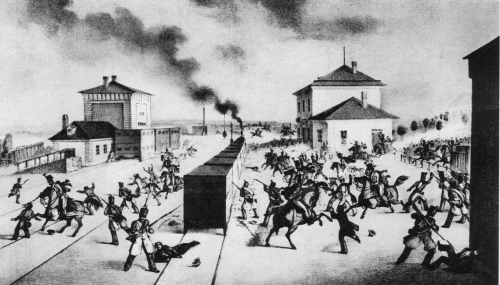17 June 1848 Bloodshed in Běchovice
Categories: Years of war and revolution , Calendar

From 12th to 17th June 1848 an uprising took place in Prague, which culminated the revolutionary process in the Czech lands. The whole railway from Olomouc to Prague was busy at that time. The tragedy occurred in Běchovice, where at least seven people died. Soldiers were said to have fired into crowded carriages.
On the first day of the Prague riots, on Whit Monday 12. June, the Prague railway station in Hybešova Street witnessed bloody clashes. During the storming of the barricades in the New Town of Prague, the army also occupied the houses opposite the station and the inn from which the soldiers stormedThe soldiers entered the station building and arrested the official on duty, who was stabbed with a sword by the centurion Scherb.
On the morning of Wednesday, June 14, a special train from Vienna brought to Prague members of a court commission to ascertain the true state of affairs. The Court War Council was represented by its second vice-president, Field Marshal Count Mensdorff-Pouilly.
On the night of 16-17 June, Prague was fiercely shelled and the Old Town mills were burnt down. The counter-insurgency was led by the commanding general in Bohemia, Alfred von Windischgrätz. Panic gripped the city, with thousands fleeing to the countryside. As early as five o'clock in the morning, long train trains, consisting of every type of passenger and freight car that could be found, were leaving the Prague railway station. "In one afternoon, the trains took three thousand people out of the capital," recalls Vojtěch Szajkó in his book Railways, Post and Telegraph of the Austrian Army in 1848-1914.
There was a terrible crowd at the ticket offices and the trains were packed to bursting. The Czech historian Václav Vladivoj Tomek, among others, gave testimony to these events, stating in his memoirs that the train he decided to take from Prague had twelve carriages, with over 120 people in each. He and his family boarded the crowded train at 6.30 a.m., but they did not leave until noon. C.K. soldiers stopped and inspected each train at the invalid station, causing another hour's delay. Tomek did not reach Pardubice until the evening.
Early in the morning of 17 June Windischgrätz had the railway station of Běchovice occupied by a squadron of hussars. "Together with them, the 9th and 10th centurions of Latour's 26th Infantry Regiment, led by centurions Fialka and Elvenich, were garrisoning the Běchovice station, supported by a battalion of Khevenhüller's infantry with several guns. The second train from Prague, which was crowded with refugees, entered the station after six o'clock in the morning, was stopped, the locomotive disconnected and both station gates closed. The train was mainly used by the guardsmen from Kolín and Kutná Hora, who had arrived in Prague the previous day, to return home. The train was surrounded by troops and the passengers were asked to surrender their weapons.
However, this was slow and everyone was ordered to disembark. "Suddenly someone on the train fired at one of the soldiers and a bloody melee broke out. The soldiers were furiously hacking at people with their sabres and firing into the crowded carriages. Another version claims that the soldiers became enraged after recognising a bloody grenade pouch, captured by a Guardsman in the Prague fighting, while handing over their weapons. Most of the people were herded into the reception building of the Bechovice railway station. Windischgrätz held the hussars back with great effort to prevent an even greater massacre," Szajkó describes.
However, the result of the Bechovice massacre was ultimately terrible. "Ten dead and more than eighty wounded, most of them seriously, were left lying at the scene of the slaughter. Only the Cologne Guard had over thirty wounded, not counting the dead," says Vladimír Klimeš in his book Czech Villages in 1848. Other sources state that at least seven people died during the massacre. The following months were much quieter.
Sources:
Vojtěch Szajkó: Railways, Post and Telegraph of the Austrian Army in 1848-1914
Vladimír Klimeš: Czech Village in 1848
www.praha-bechovice.cz
https://cs.wikipedia.org/
The article is included in categories: